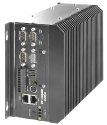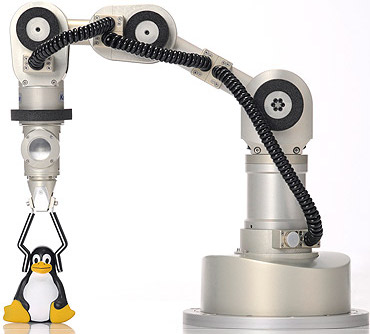Real-time technology gains user conference
Aug 6, 2009 — by Eric Brown — from the LinuxDevices Archive — 9 views[Updated: Aug. 7] — Denx announced the first Xenomai User Meeting, which will co-locate with OSADL's Eleventh Real Time Linux Workshop in Dresden, Germany, on Sep. 28-30. The Xenomai meeting will showcase this real-time Linux extension alternative to PREEMPT RT — and maybe help make peace between warring camps.
Held on Sept. 28, the first day of the Eleventh Real Time Linux Workshop (RTLWS11 ), the inaugural Xenomai User Meeting (XUM 2009) will bring together users and members of the core development team of the Xenomai Real-Time Framework for Linux, while also reaching out to new users. The event is billed as "a chance to meet well-known Xenomai experts face to face" and to "learn about the latest use cases, development projects, problems and solutions."
Opening speakers include Denx founder Wolfgang Denk and Xenomai founder Philippe Gerum, and the preliminary list of sessions includes:
- Xenomai operation in the industrial environment of printing systems — Roderik Wildenburg, Manroland AG
- ARM fast context switch extension for Linux — Richard Cochran of Omicron Electronics, GmbH, and Gilles Chanteperdrix of Xenomai.org
- About the challenges and successes with Xenomai in an industrial environment — Andreas Glatz, Ruggedcom Inc.
- Real time toolkit for open robot control software — Peter Soetens and Markus Klotzbucher, Katholieke Universiteit Leuven
 |
German embedded firm Denx Software Engineering is sponsoring the event in collaboration with the Open Source Automation Development Lab (OSADL). Denx has been a staunch supporter of Xenomai, and bundles the technology with the Denx Embedded Linux Development Kit (ELDK) software development kit (SDK), an open-source Linux distribution and development tool suite that is especially popular in Europe's industrial Linux community. Among other implementations, Xenomai is incorporated in the Linux-based emPC-M industrial computers (pictured at left) from German industrial PC vendor Janz Automationssysteme AG.
Xenomai implementations include Neuronics' ELDK-based Katana Robotic Arm (pictured below). Here, Xenomai provides a development framework that cooperates with the Linux kernel to provide pervasive, hard real-time support to Nucleus-, kernel-, and user-space applications.
Xenomai basics
The Xenomai pre-emption and scheduling real-time technology provides "skins" for emulating API requests for different real-time operating systems (RTOSes). It enables the writing of applications with strict timing constraints for hard real-time applications. Interfaces include RTOS interfaces (pSOS+, VRTX, VxWorks, and RTAI), standardized interfaces (POSIX, uITRON), or new interfaces designed with the help of RTAI (native interface).

Neuronics' Xenomai-infused Katana Robotic Arm (penguin not included)
Xenomai/SOLO dispenses with its predecessors "co-kernel" approach, in which real-time applications run on a separate kernel that "cooperates" with the Linux kernel. Since Xenomai/SOLO integrates the RTOS emulation layer more tightly with the Linux kernel, developers don't need to worry about configuration mismatches that often occur with a co-kernel, says the group.
 |
Bridging the Xenomai/PREMPT RT rivalry
In an email statement, Denx founder and CEO Wolfgang Denk (pictured), notes that Denx, which long maintained the PowerPC branch of RTAI, has been focused on Xenomai from the start. Denk praises Xenomai for its RTOS emulation capabilities and says the technology deserves to stand side by side with the currently popular PREEMPT RT real-time extensions being developed at OSADL.
"Xenomai really guarantees hard real-time behavior, which is something that PREEMPT RT does not," writes Denx. "PREEMPT RT is more or less 'probabilistic real-time', in that any change to the configuration, and especially any changes to the Linux kernel code, like a device driver being updated or added, can change the [real-time] behavior. In Xenomai, the real-time operation remains the same, as the 'normal' Linux kernel runs isolated in the secondary domain."
OSADL's goal is to "establish a hard real-time capable POSIX standard conforming Linux kernel, with special focus on the requirements and needs of the automation industry," writes Denk. He adds that OSADL focuses on interfaces, but does not go into detail about the specific implementation, so Xenomai remains compatible with OSADL's vision.
Nevertheless, PREEMPT RT development work has been a major thrust at OSADL. In June, the group released a "latest stable" real-time Linux kernel based on PREEMPT RT and Linux 2.6.29, and merged its threaded interrupt real-time code into the Linux 2.6.30 mainline.
"A majority of OSADL members base their work on the PREEMPT RT," admits Denk, who goes on to say that to some developers the choice between PREEMPT RT or Xenomai is "a matter to make religious or at least flame wars of."
While Denx sits on the Xenomai side of the divide, Denk says the company has a practical approach to the schism. "If the customer wants PREEMPT RT, we support him doing this. But our recommendation is Xenomai."
Denk notes that Denx has sponsored several projects "to reduce the (mostly political) gap between the two approaches of real-time support for Linux." These include an RTDM Native Support project that supports real-time Linux drivers that can be used without changes in both environments, as well as Xenomai/SOLO where Denx "adapted the Xenomai RTOS emulation capabilities for the standard Linux kernel, thus making this available for PREEMPT RT, too," writes Denk.
Denk concludes that both PREEMPT RT and Xenomai enable OSADL to implement "what it is looking for."
Availability
More information and registration for Xenomai User Meeting 2009, which will be held be at Technische Universitat Dresden (Dresden Technical University) on Sep. 28, may be found here. A list of submitted papers for the Eleventh Real Time Linux Workshop (RTLWS11), which will be held in the same venue on Sept.28-30, may be found here.
More information on Xenomai may be found here, and more on Denx projects related to Xenomai should be here.
This article was originally published on LinuxDevices.com and has been donated to the open source community by QuinStreet Inc. Please visit LinuxToday.com for up-to-date news and articles about Linux and open source.